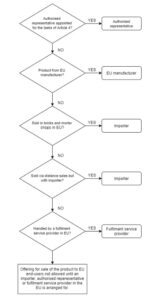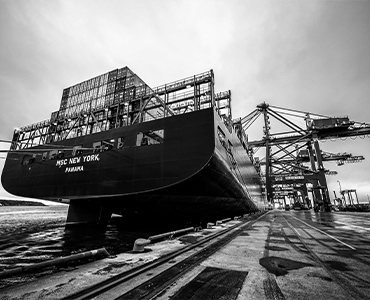
Do you need an EU authorised representative when selling in the EU?
This article describes what an EU authorised representative is, when you need one and what they can do for you when selling your products in the EU market.
What is an EU authorised representative?
An EU authorised representative is a natural or legal person established within the EU, who has received written approval from a manufacturer to act on its behalf in relation to specified tasks regarding the manufacturer’s obligations under the relevant EU harmonisation legislation or under the requirements of regulation (EU) 2019/1020 (the market surveillance regulation).
Although an authorised representative (AR) can be appointed by a manufacturer inside as well as outside the EU, under regulation (EU) 2019/1020 the AR acts as a liaison between the manufacturer based outside the EU and a national authority within the EU. When non-EU companies don’t have any actual presence or an address in the EU, an authorised representative serves as their contact person.
An authorised representative agreement is signed between the two parties, allowing the manufacturer to display the authorised representative’s address on its product packaging. Manufacturers are obligated to display the address of an economic operator on their product packaging. An economic operator is a manufacturer, importer, authorised representative, distributor, fulfilment service provider, or any other natural or legal person established in the EU.
Variations on EU authorised representatives are EU representative, (EU) responsible person, authorised representative CE, and EC representative (or EC Rep).
What is an EU representative?
Although not an official term, an EU representative is the same as an EU authorised representative.
What is an (EU) responsible person?
Amazon uses the terms ‘responsible person’, ‘EU responsible person’, and ‘CE responsible person’ on their website. By this, Amazon means the following economic operators: manufacturer, importer, distributor or authorised representative under regulation (EU) 2019/1020.
Amazon requires for many products that their sellers have an EU-based economic operator to prevent Amazon being considered as the responsible economic operator themselves.
The term ‘responsible person’ can also be found in regulation (EU) 1223/2009 on cosmetic products. According to this regulation, the responsible person can be the manufacturer, importer, distributor, or another person established within the EU who ensures the compliance of a cosmetic product placed into the EU market. This is not the same as the authorised representative mentioned above.
What is an EC Rep?
An EC Rep is the term that is sometimes used to indicate the authorised representative for medical devices. In those cases, this person is the liaison between non-EU medical device manufacturers and national competent authorities and notified bodies in the EU. An EC Rep is an EU-established point of contact that ensures the compliance of non-EU medical devices with European directives.
The appointment of an EC Rep is a requirement of the European medical device regulations and in vitro diagnostic medical device regulation for non-European manufacturers wishing to sell medical devices and in vitro diagnostics on the European market.
The authorised representative must ensure compliance of the medical devices manufactured by the non-EU manufacturer. Also, in the event that a non-EU manufacturer has not complied with its general obligations, the authorised representative is legally liable for defective devices.
What is the market surveillance regulation (EU) 2019/1020?
The market surveillance regulation is the name for regulation (EU) 2019/1020. The regulation aims to improve the functioning of the internal market by strengthening the market surveillance of certain products. Businesses from outside the EU that sell products in the EU are required to have an economic operator located in the EU to act as a liaison between the manufacturer based outside the EU and the EU-based national authority.
An economic operator is a manufacturer, importer, authorised representative, distributor, fulfilment service provider, or any other natural or legal person established in the EU.
The overall objective of the market surveillance regulation is to protect consumers against products that may endanger their health and safety. The regulation strengthens the monitoring of the European market and protects the public interest. Other than general health and safety, the regulation also protects public interest concerning health and safety in the workplace, the environment, and public security. The regulation was adopted by the European Commission and enforced on July 16th, 2021.
Do I need an authorised representative in the EU?
With regulation (EU) 2019/1020 in force, you can no longer sell most products in the EU market without the address of an economic operator within the EU, such as an EU authorised representative, stated on the packaging or product. Due to Brexit, this also applies to sellers from Great Britain, who now need an economic operator or an authorised representative within the EU or Northern Ireland if they want to sell to the EU.
But also for most that fall under the general product safety directive, you need an EU authorised representative.
E-commerce platforms such as Amazon may require you to have an EU authorised representative when selling products on their platform. This requirement is the result of EU regulations, such as regulation (EU) 2019/1020.
What products in the EU require an EU authorised representative?
According to regulation (EU) 2019/1020, all manufactured products falling under harmonisation legislation listed in Annex I of the regulation need an economic operator. (See List of most products requiring an AR according to regulation (EU) 2019/1020).
Are there any more products apart from those listed in Annex I of regulation (EU) 2019/1020 that are affected? We believe so. To explain why, we have to look at the General Product Safety Directive (GPSD).
The GPSD is a catch-all directive that applies to all products. It states the following:
“… an indication, by means of the product or its packaging, of the identity and details of the producer and the product reference or, where applicable, the batch of products to which it belongs, except where not to give such indication is justified”
When looking at the definitions in the GPSD, you see that the producer is either the manufacturer of the product (when they are established in the Community), the manufacturer’s representative (when the manufacturer is not established in the Community) or, if there is no representative established in the Community, the importer of the product.
In other words, if the manufacturer is not based in the EU, the importer automatically becomes the producer if the manufacturer has not appointed an authorised representative.
We can now conclude that there needs to be an EU-based economic operator for many more products than listed in the annex of (EU) 2019/1020. The above section also shows that you need to indicate the “identity and details of the producer,” which should be interpreted as meaning that any product needs to have the contact details of the producer on it.
The only situation we have seen where you may not need an EU address on the product is when you sell a GPSD product directly to end users from a non-EU country, without involving any economic operator (such as an importer, distributor, or fulfilment service provider).
Hence, our conclusion is that the surest way to sell any product legally into the EU is to have the contact details of the importer or an appointed authorised representative on the product or packaging.
List of most products requiring an EU AR according to regulation (EU) 2019/1020
To give you a better idea of what products are subject to the Union harmonisation legislation, the following list contains most of the product types that are listed and need an economic operator, such as an authorised representative, established in the EU:
- Aerosol dispensers
- Agricultural and forestry vehicles
- Aircrafts
- Appliances burning gaseous fuels
- Batteries and accumulators
- Biocidal products
- Bottles used as measuring containers
- Cableway installations
- Chemicals
- Construction products
- Cosmetics
- Crystal glass
- Detergents
- Electronic products
- Energy-related products (falling under Directive 2009/125/EC)
- Equipment for use outdoors emitting noise
- Explosives
- Fertilisers
- Fluorinated greenhouse gases
- Footwear
- Hot-water boilers fired with liquid or gaseous fuels
- Hydrogen-powered motor vehicles
- In vitro diagnostic medical devices
- Lifts and safety components for lifts
- Machinery
- Marine equipment
- Measuring instruments, such as most beverage glasses, pints, etc.
- Medical devices
- Motor vehicles, trailers and systems
- Non-automatic weighing instruments
- Paints and varnishes
- Persistent organic pollutants
- Personal protective equipment, such as sunglasses, gloves and face masks
- Packaging and packaging waste
- Petrol (gasoline) and diesel fuels
- Pre-packaged products that indicate the quantity units of weight or volume, not less than 5 g or 5 ml and not more than 10 kg or 10 l
- Pressure equipment
- Products containing mercury
- Pyrotechnic articles, such as fireworks
- Radio equipment
- Recreational craft and personal watercraft
- Simple pressure vessels
- Substances that deplete the ozone layer
- Textile products
- Tobacco products
- Toys
- Two- or three-wheel vehicles and quadricycles
- Tires
Do CE products require an EU authorised representative?
As all CE directives and regulations are listed in Annex I of regulation (EU) 2019/1020, CE products do need an EU authorised representative.
Which products do not require an authorised representative?
The only situation we have seen where you may not need an EU address on the product is when you sell a GPSD product directly to end users from a non-EU country, without involving any economic operator.
Are authorised representatives in the UK recognised in the EU?
A UK authorised representative is not recognised in the EU.
Do you need to appoint an EU authorised representative?
Now that we have determined that an EU-based economic operator is needed for all products sold in the EU, we should discuss if an authorised representative is needed.
There are four different economic operators (manufacturer, importer, authorised representative, and fulfilment service providers) described in regulation (EU) 2019/1020. The flow chart in Figure 1 indicates how the regulation determines who is the EU-based economic operator for a certain product and it does show that any of the four responsible economic operator can perform this role. However, unless one of them does, you are not allowed to sell the product(s) in the EU market!

Figure 1 A hierarchy for determining who is the responsible economic operator in different supply chains
Note that while regulation (EU) 2019/1020 only requires that one responsible EU-based economic operator should be appointed, specific legislation (directives or regulations) may also require that the information of the importer be placed on the product, so you need to check the legislation applicable for your product(s).
What does an EU authorised representative do?
An EU authorised representative represents a manufacturer that is based outside the EU market, and acts on its behalf in relation to ‘specified tasks.’ These tasks may differ, depending on the requirements that apply to the product. The tasks of the AR are defined in several directives and regulations.
In the EU, regulation (EU) 2019/1020 is the basis for determining which tasks the EU authorised representative is responsible for, with the other legislation adding additional tasks. Regulation (EU) 2019/1020 defines the following tasks and obligations for the EU authorised representative:
- Verifying that the declaration of conformity (DoC) or declaration of performance (DoP) and technical documentation have been drawn up, keeping a copy of the DoC or DoP at the disposal of market authorities, and making sure that the technical file can be made available.
- Providing all documentation necessary to demonstrate the conformity of the product, if the market surveillance authority requests information.
- Informing the market surveillance authorities if the authorised representative has reason to believe that a product poses a risk.
- Cooperating with the market surveillance authorities to mitigate the risks presented by that product when required to do so by the market surveillance authorities or on its own initiative.
Some of the additional tasks of anEU authorised representative, as described in other legislation, may include:
- Communicating with the market surveillance authorities on behalf of the company.
- Carrying out a technical document review.
- Verifying completeness and correctness of the technical file.
- Drawing up an EU authorised representative agreement and authorising the company to use their address on their product packaging.
- Registering the product with the appropriate competent authority.
- Performing any other tasks that are outlined in the written agreement between them and the manufacturer.
The official tasks and responsibilities of your AR will be laid out in the contract you sign, so make sure you read it thoroughly and understand it before proceeding.
An authorised representative for the GB market (a so-called UK AR) has similar tasks and responsibilities as an EU AR. A manufacturer may ask an appointed AR, among other things, to affix the UKCA marking, draw up and sign a UK DoC, store the necessary technical documentation and cooperate with market surveillance authorities.
Which documents does an EU representative require?
An EU authorised representative requires the following documents:
- If applicable, a copy of your product’s declaration of conformity. The declaration of conformity is a mandatory document for products falling under CE marking. By signing the declaration, the manufacturer declares that the product complies with the relevant regulations and requirements.
- A copy of your product’s technical file. The contents of the technical file for your product are determined in the applicable regulations and directives.
What are the potential legal pitfalls if I do not have an EU authorised representative?
What could be the consequences of not having an EU authorised representative (or importer)? The truth is, failing to appoint an EU authorised representative or importer may cause a great number of issues for your company. There are several checkpoints throughout the process of selling your product where it will be stalled if it does not have an address of an economic operator associated with it.
Here are the points along the way where your product will be checked:
- If your product, machinery, device, or equipment is shipped from outside of the EU and inspected by customs, and it does not have an address of an economic operator, it will not be allowed to enter the market. There’s a risk that you will be fined or that the shipment will be destroyed.
- If you’re selling products through an e-commerce platform in the EU, issues may arise when it gets to the fulfilment service provider or when you list your product on your seller’s account. Marketplaces such as Amazon will check for the presence of an economic operator and if they don’t see an address, they may block the product.
- Market surveillance authorities can check the product for compliance with the requirements. If they discover that you don’t have an economic operator and don’t comply, you may be asked to do a recall of your product.
How to avoid legal pitfalls and keep selling products in the EU market
When you are a non-EU business and you want to sell products in the EU market, the only way to avoid legal pitfalls is to have an importer or authorised representative within the EU.
Simply put, if you want to sell products to the EU without hassle, make sure you have an economic operator established within the EU.
Make sure to have the address of the importer or an EU authorised representative on the product (or its packaging or an accompanying document, if allowed, according to applicable directives and regulations).
How do I choose a good EU authorised representative?
Complying with product regulations can be challenging, but it’s incredibly important. You’ll need to find an EU authorised representative with a strong network and good connections in the EU, who stays updated and informed on regulatory affairs and who makes representing you effectively an important priority.
If your business is based outside the EU and doesn’t sell solely online but through an importer, an authorised representative may be of added value. For example, you may not want your importer to be the one who has access to your full technical file, as it can often contain essential business knowledge. Or maybe the importer is not suitable to fulfil the required duties, for example checking the technical file and communicating with market authorities, or is reluctant to deal with requests from market surveillance authorities.
European authorities will continue to tighten regulations and be more vigilant with the products entering the market. Choosing an authorised representative who can help you stay compliant is more important than ever and will be essential for the future of your company. It will help you to avoid legal pitfalls and ensure that you can keep selling your products in the EU market.
Where can I download a European authorised representative agreement template
A European authorised representative agreement is a contract that defines the agreements between an EU-based AR and a non-EU based manufacturer.
The agreement outlines the authorised representative’s official tasks and responsibilities, and what is required from them to uphold compliance.
To download an agreement template from 24hour-AR, click here:
Click here to download an EU-AR mandate agreement template.
Get a signed AR agreement from 24hour-AR in just 24 hours
24hour-AR is a compliance company with over 25 years of experience in the field of product safety. 24hour-AR acts as a legal entity representing and supporting your businesses with EU and UK compliance requirements, so that you can easily do business anywhere in the EU and the UK. Our services help avoid legal pitfalls by allowing our address to be placed on your product and holding certain technical documentation within the market, as required by law.
Where most companies take two weeks or more to act as an Authorised Representative, we promise a signed AR agreement in just 24 hours after you provide us with the correct documentation – or you’ll get a 50% discount. We are currently offering our services for all products, except medical devices, cosmetics, biocides, and the take-back directives, such as WEEE directive.
In addition to our AR services, we also offer legal consultancy, full CE Marking support, and technical communication services. With this range of services, 24hour-AR is a full-service compliance partner.
There are three steps to sign us up as your AR:
- Fill in the Get Started form.
- Follow the instructions that you receive.
- Start using our address.
Ready to get started? We hope to hear from you soon!
If you still have more questions, feel free to contact us at info@24hour-ar.com.
How much does an AR in the EU cost?
The annual fee depends on the number and type of products, but the following is generally true:



